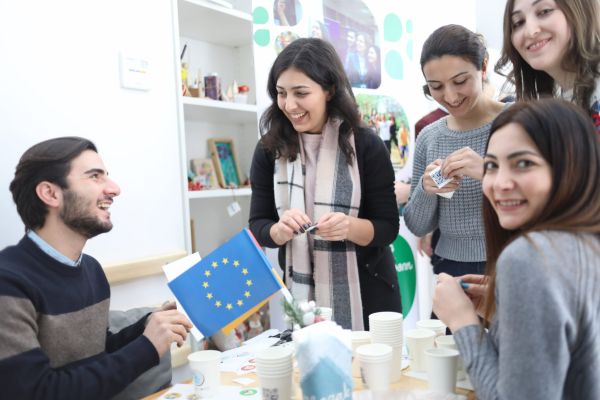Erasmus+ in Armenia

I’d love to study abroad but I don’t have the money: can the EU help me?
Yes it can! Have you heard of Erasmus+? Through this programme, the EU offers student exchanges in European universities at bachelor, master and doctoral levels – the exchanges will be part of the programme you are following and can last between one term and one year. And your expenses will be covered! You can also apply for an Erasmus+ scholarship to study for a Master’s degree at top European universities.
Almost 5,000 university students and staff from Armenia were able to study or teach in Europe as part of Erasmus+ exchanges from 2015-2020, while 171 Armenian students have earned Master’s scholarships since 2004, with numbers growing every year – so it’s definitely worth a try!
It sounds like Erasmus+ is good opportunity for me, but how can I apply?
For exchanges, visit the international relations office at your university – they will tell you which opportunities are available in your subject and will help you to apply.
For a Master’s degree, you need to check out the catalogue of Erasmus Mundus Joint Master Degrees, which lists the courses offering Erasmus scholarships in the upcoming academic year (there are 206 courses), then contact the university to apply for the course and scholarship.
The National Erasmus+ Office in Armenia is there to help you with any information. You can check out their website for more information, email them at info@erasmusplus.am, or call them on +374 10 580963.
What about language? Do I need some sort of English certificate?
It depends on where you will be studying and in which language the course is taught. Some exchanges offer courses in English, while others will be taught in the local language. Remember that taking part in an Erasmus exchange means you need to follow lectures, write essays, and take exams in the language of instruction. If you do not have a relevant language qualification, you will be asked to take a language test to assess your level.
Before leaving, all exchange students must take an Erasmus+ online language assessment. The assessment results do not prevent you taking part in the programme, but can be used to identify if you need support, which is available through Erasmus+ online language support. In some cases, the host university may also offer language classes.
Will I receive a scholarship? How much?
For student exchanges, the EU provides up to €1,500 (depending on the distance between home and host countries) to cover travel expenses and €800-€900 a month for living expenses.
For the Master’s scholarships, the scholarship will be a contribution to the costs incurred by the beneficiary students and shall cover travel, visa, installation and subsistence costs. The scholarship is calculated as €1,400/month for the duration of the Master’s programme.
What are the benefits of Erasmus+? Is it easy to find a good job afterwards?
Many international studies have shown the benefit of studying abroad under Erasmus+ – Erasmus graduates have more chance of finding a job, tend to be given greater professional responsibility and are more likely to start their own company.
But talk to any graduate and what they remember most are the personal skills they have developed – the knowledge of other countries, the ability to interact with people from different cultures, greater communication skills, adaptability, above all the friends they have made and the new perspective on life that they have gained.
The best endorsement comes from those have taken part – meet David, Kristina and Irena, and Satenik to find out what Erasmus meant for them… and also precious tips on how to apply and make the most of the experience.
Talking of jobs, I hear Erasmus+ also offers chances for work placements in Europe – is this really true?
Yes, Erasmus+ supports work placements and internships abroad for Bachelor, Masters and Doctoral students, as well as recent graduates (within one year of your graduation). But your traineeship must be relevant to your degree and, wherever possible, be integrated in your study programme, so check the opportunities with your university. Work placements can last between two and twelve months, and Erasmus+ grants are available to cover your costs.
Work placements or study periods abroad are also available if you are currently enrolled in vocational education and training (VET). You will be hosted either in a workplace or in another VET institution abroad, with periods of work-based learning as part of your studies. You need to check with your VET organisation to find out if these opportunities are available to you.
I am not a student, but I’d love to take part in an activity abroad – are there any opportunities for me?
Yes! Erasmus+ is not just for students. From 2014-2020, almost 9,000 young people and youth workers from Armenia participated in joint Erasmus+ Youth projects (exchanges, trainings, policy debate, volunteering).
The EU offers youth exchanges, open to anyone between the ages of 13 and 30, and lasting between 5 and 21 days. These could involve workshops, exercises, debates, role-plays, outdoor activities and more. These exchanges take place through youth organisations and you cannot apply directly as an individual. To find out more, contact the Erasmus+ Youth Info Centre in Armenia by visiting their website or their Facebook page, calling +374 94 525254, or email info.armenia@salto-youth.net.
Another great opportunity to gain experience abroad is by volunteering through the European Solidarity Corps. This is a unique way to experience different cultures and make new friends, while also helping others and learning new skills. You need to be between 17 and 30 and be willing to spend between two weeks and 12 months abroad. Volunteer projects could be in fields as varied as culture, youth, sports, children, cultural heritage, arts, animal welfare or the environment. Find out how to apply on the European Solidarity Corps portal.